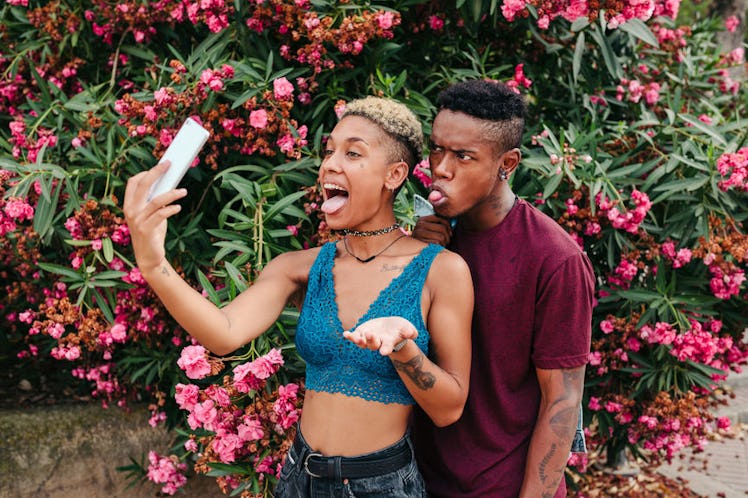
6 Ways Your Body Language Suddenly Changes When You're In A New Relationship
You begin to date someone. Your legs may brush up against each others' on your first date. You may hold hands walking from bar to bar on the second or third date. You give them a hug and quick peck kiss goodbye after the fourth date or so. How does your body language change when you're in a new relationship? Well, that depends on what you're comfortable with, first and foremost, but according to experts, it can change a lot from your single days. As you get to know someone more, your body will instinctually communicate differently than it does when you're single.
Body language experts Traci Brown and Blanca Cobb weighed in on the subject to discuss ways your body language changes when going from just dating to a more serious relationship. They both say that your body language changes when you're with your partner, as well as when you're physically apart from them.
Cobb highlights that it's important to take notice of what a couple's baseline would be.
As you get to know someone more, your body will instinctually communicate differently than it does when you're single.
"Go back to [your] baseline: What’s typical for that couple," Cobb tells Elite Daily. "As time goes on, you should see increases in frequency and increases in duration." Basically, your body language with your partner may differ from others in terms of what kind of PDA you're comfortable with, but there will probably be some kind of progression from when you began to date. Read on to see how your body language will change.
You can't stop looking at them.
Cobb and Brown both pointed out that when you're in a serious relationship, you'll just want to look at them longer. Earlier on in the dating process, you may be reluctant to meet their eyes due to it making you vulnerable, but later on, you probably won't be able to stop staring.
Cobb notes there is "a lot of lingering and looking into each other’s eyes."
You'll walk side-by-side.
It'll feel natural to walk alongside your partner when you've grown your bond and feel secure in the relationship.
You probably won't be able to stop staring.
"When a couple walks, they will normally walk beside each other," Cobb says. "When you see a couple walking shoulder-to-shoulder, it’s a good sign they see each other as relatively equals in the relationship."
You'll mirror their movements.
This is something that will develop in time with partners. You'll subconsciously mimic the movements they make, since you are so close.
"They'll gently start to match each other's movements which is really fun to see develop," Brown tells Elite Daily.
You'll find excuses to touch them.
Cobb says that during the honeymoon phase, or the first year of a relationship, you'll want to sit near your partner just so you can touch them.
"[Your] legs [will be] draped on their legs, [you'll be] sitting at a table and having dinner with other people, and reach out and touch your partner," Cobb says. "You’re talking to somebody else at the table, and that physical touch is a ‘Hon, I’m thinking of you, I want to be with you, this is me and you, but I’m still talking to other people.'"
You may develop nervous habits when you're apart.
If you're going to social events without your partner, like if they're away for work or you live in different cities or states, you may develop some nervous ticks while you attend events alone. Since you may subconsciously feel a little guarded or nervous when your partner isn't around, you may develop habits like picking at your hair, tapping your feet, or have your eyes a bit glazed over during conversation, says Cobb.
"Even if [you're] with a group of friends [you] know, [you] could be missing [your] person," Cobb says. Body language that indicates you're feeling checked out or sad could include being distracted, looking down, or looking away. "It could be this glazed look over [your] eyes," Cobb adds.
You may be a tad more reserved when you're not with them.
Brown says in social settings, you may be a little less likely to be the life of the party if you have a relationship. Because of that, your demeanor may shift.
"This is going to widely vary," Brown says. "But generally if someone is in a committed relationship, they're going to be just a tad more reserved in public — they don't need to find a partner any more! This can be from volume of voice to how much they talk to even making their gestures slightly smaller."
If you're in a relationship and your body language changes, you may not even notice these differences. Many of them are subtle shifts that come with a partnership in your life. If you're in a relationship, try to notice if you exhibit any of these behaviors moving forward. It may be fun to notice, especially the mirroring-your-partner thing!